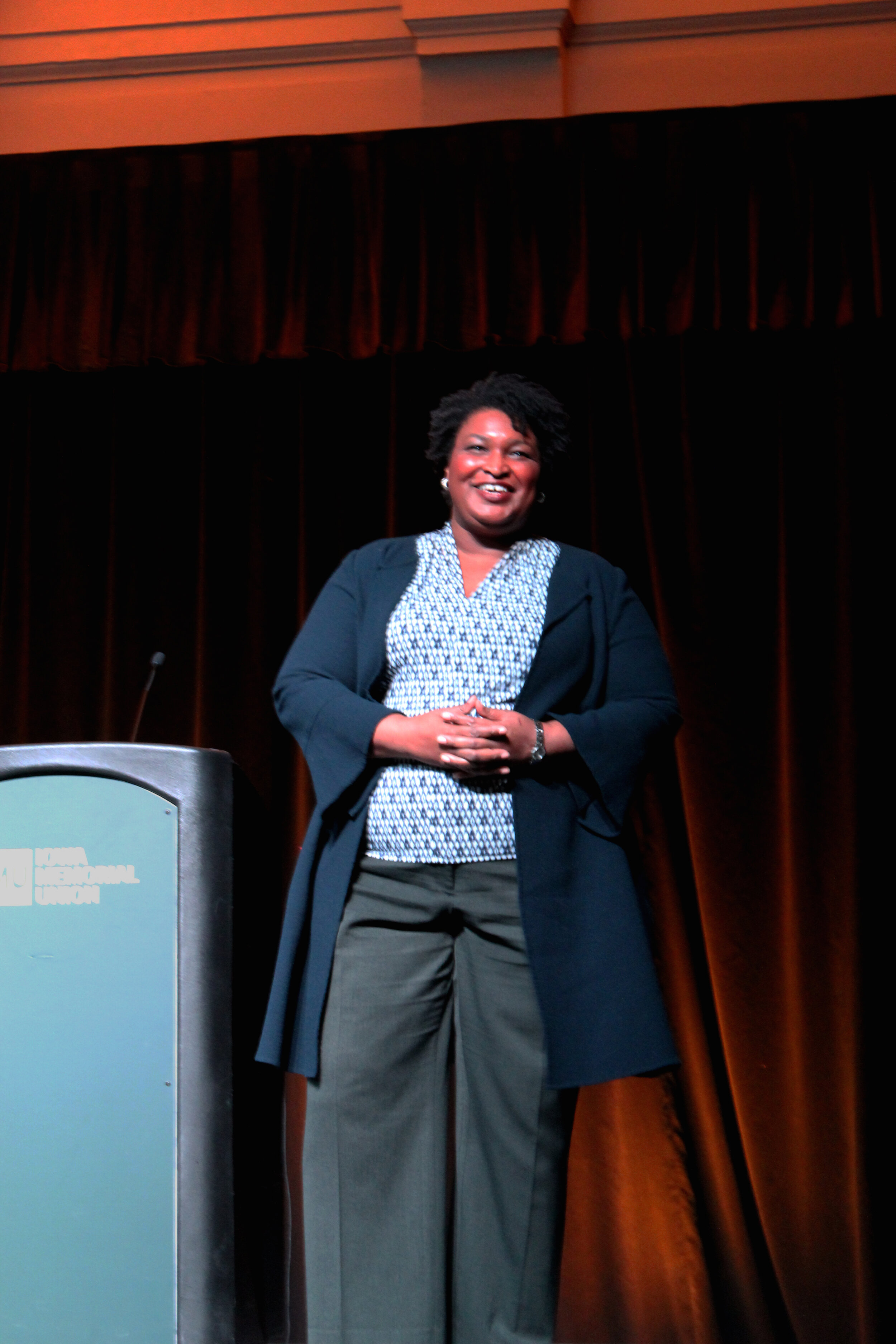Accessing Power: Iowa City Welcomes Stacey Abrams
by Lillian Poulsen
Photos by Kathryn Raver
Stacey Abrams at the Iowa Memorial Union.
Photo by Kathryn Raver
On Monday, November 5th, over 700 students and members of the community traveled to the Iowa Memorial Union to listen to politician Stacey Abrams speak about free and fair elections. Abrams’ visit landed just shy of the 100th anniversary of women’s suffrage in the United States.
Stacey Abrams on Twitter @staceyabrams
Stacey Abrams began the lecture by saying, “I am not the Governor of Georgia,” in response to critiques suggesting that she believes she beat Brian Kemp in the 2018 race. As Abrams explained, Kemp used his position as Secretary of State to beat her by purging minorities from voter rolls. Kemp claimed the voters “moved,” but they still lived at their registered address. After her loss, Abrams founded Fair Fight, an organization working to end voter suppression across the country. She believes white men attempt to limit the threat to their power by disenfranchising minority and women voters. As she explained, “Democracy is ultimately only about power, and the key to that power is the right to vote.”
Since our country’s formation, the access to vote has symbolized the access to power. What started as an attempt to keep this power out of the hands of women and minorities began transforming in the centuries that has brought us to this year of celebration. As the American public began celebrating women’s suffrage, Stacey Abrams reflected on the history that led to this monumental law. Through the efforts of many women, including Susan B. Anthony and Sojourner Truth, the 19th amendment to the Constitution guaranteed that all citizens had the right to vote regardless of gender. Abrams highlighted the importance of this amendment stating, “The suffrage in 1920 meant that we see each other, we trust each other, we will invest in each other.”
Abrams also discussed the history of minority voter suppression. The Three-Fifths Compromise in 1787 counted only 60 percent of votes from Black Americans, suggesting their bodies mattered more than their voices. The 14th amendment served as the first time the US government acknowledged Black people as citizens, and the 15th granted Black men the right to vote. Despite these “strides” towards equality, the US government continued to find ways to suppress minority voters.
Throughout the 19th and 20th centuries, Black Codes, Jim Crow laws, literacy tests, and other oppressive regulations intentionally kept voting power out of the hands of Black Americans. Similarly, until 1924, the US government didn’t consider Native Americans as citizens. In the mid-20th century, during my grandparents’ lifetimes, Native Americans, Asian Americans, and Latinx Americans finally received the right to vote. Additionally, the Voting Rights Act of 1965 transformed the right to vote, making it more accessible than ever before.
Stacey Abrams
Photo by Kathryn Raver
Even with these changes, voter suppression continues to prohibit minorities from accessing the power of voting. In 2013, the government reversed the Voting Rights Act which led to the closing of 1,688 polling places and the purging of more than 17 million people, mostly minority individuals, from voting rolls. Another way the government suppresses minority voters is felon disenfranchisement. Abrams explained that instead of enslaving Black men, the government finds ways to arrest and send them to prison to prohibit them from voting by labeling them as felons. Along with this, strict voter ID laws work to prevent newly naturalized citizens and Black citizens from voting. Abrams discussed the importance of the Help America Vote Act, which governments intended to make voting more accessible by allowing citizens to cast provisional ballots. Instead, the ballots serve as a tool to make sure minority voters don’t receive “real” ballots, so the government doesn’t have to count their votes.
In response, to make sure everyone receives this access to power, Stacey Abrams suggested the audience do three things: register to vote, read, and do what’s right. Abrams encouraged listeners to reach out to ten friends to make sure they registered, especially since the next local election will be the first time in Iowa where the government requires voter IDs. She also explained the importance of responding to the spread of misinformation on the internet. Abrams closed her call to action by pointing the audience to her Fair Fight website and encouraging them to sign up.
For more information about registering to vote, please visit https://www.lwv.org/ or https://www.vote.org/register-to-vote/.




